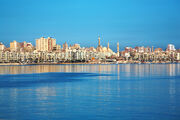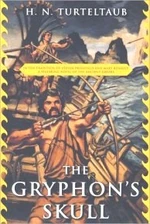For the American cities, see Alexandria, Louisiana and Alexandria, Virginia

Alexandria (اسكندريه, pronounced [eskendeˈrejjæ] in Egyptian Arabic) is the second largest city in Egypt, with a population of 4.1 million, extending about 32 km (20 mi) along the coast of the Mediterranean Sea in the north central part of the country. It is also the largest city lying directly on the Mediterranean coast. Alexandria is Egypt's largest seaport, serving approximately 80% of Egypt's imports and exports. It is an important industrial center because of its natural gas and oil pipelines from Suez. Alexandria is also an important tourist resort.
Alexandria is named for the Macedonian King Alexander the Great, whose general Ptolemy became the first ruler of the Ptolemaic Dynasty, which ruled from Alexandria, the capital, until the death of Queen Cleopatra VII 300 years later. During the Hellenistic age, it was home to the greatest Library in the Western world. Until the Middle Ages, it was home to the Lighthouse of Alexandria, one of the Seven Wonders of the World.
Alexandria in Agent of Byzantium[]
Alexandria, Egypt, was an ancient city even as the Roman Empire reckoned things. It was the capital of the Ptolemies before Rome had acquired the province, and the Augustal prefect continued to use their palace as the place of government. Because of its age, its citizens were among the few that felt Constantinople was the "newcomer" rather than the city.[1]
In 1309, Basil Argyros traveled to Alexandria and helped end the anakhoresis which was preventing the damaged Pharos from being rebuilt.[2]
During 1316 to 1317, an anti-icon movement began in Egypt.[3] Sailors from a grain ship from Alexandria started a riot in Constantinople over the issue when they described the turmoil up and down the Nile.[4] Arsakios, the patriarch of the city convened a synod to try to settle the matter.[5] He later presented the synod's anti-icon results at the Ecumenical Council of 1317.[6]
Alexandria in Hellenic Traders[]
In 306 BC the Aphrodite visited Alexandria on a trading run. While there, Menedemos and Sostratos also served as a sort of informal embassy from their home polis of Rhodes to Ptolemaios, the ruler of Egypt and Rhodes' sometime ally. Both missions were cut short when the Aphrodite and her crew were impressed to serve a supporting role in the Egyptian navy at the Battle of Salamis.
Alexandria in "Myth Manners' Guide to Greek Missology"[]
After defeating the Gorgons, Andromeda went on a tour of Egypt. She thought that Alexandria, which had not been built yet, would look impressive once it was built and had a lighthouse in it.[7]
Alexandria in Through Darkest Europe[]
Alexandria was the capital of Egypt, one of the most modern and enlightened nations in the world.[8]Alexandria was home to a medical madrasa that educated people from all over the world, including Europe.[9]
In the early 21st century, Aquinist terrorists detonated three truck bombs simultaneously outside the Majlis Hall in Alexandria, essentially leaving Egypt without a government for a time.[10]
Alexandria in The Two Georges[]
Alexandria was a city in the Ottoman Empire, and an important hub in the British Empire's economic network. This was reflected in the name of the important Bank of London, Victoria, and Alexandria.
Alexandria in The War That Came Early[]
The port city of Alexandria was crucial to the British war effort in North Africa beginning in 1941. With Gibraltar in the hands of the Spanish Nationalists, Alexandria was the main landing point for the British 8th Army as they met Italy's drive on Egypt and drove it back into Libya.
Unfortunately, in the summer of 1942, the war in North Africa was going against the British, as Germany came to Italy's aid, and the Afrika Korps sent the British into a perpetual retreat to Alexandria.
Alexandria in Worldwar[]
Alexandria, held by the Race, was destroyed by a German atomic bomb launched from an Elektroboot in 1944. Shortly after the city's destruction, Fleetlord Atvar toured the wreckage and was chilled by the grisly site.
References[]
- ↑ Agent of Byzantium, 2018 edition, pgs. 82-83, 86.
- ↑ "Pillar of Cloud, Pillar of Fire", generally.
- ↑ Agent of Byzantium, 2018 edition, pg. 204.
- ↑ Ibid., pgs. 201-202.
- ↑ Ibid., pg. 206.
- ↑ Ibid., pg. 211.
- ↑ E.g., Counting Up, Counting Down, p. 281, paperback.
- ↑ Through Darkest Europe, loc. 709, ebook.
- ↑ Ibid., loc. 3085.
- ↑ Ibid., loc. 709.
| |||||||||||||
| |||||||||||||
| ||||||||
| ||||||||||
| |||||||||||||||||||||||||
| ||||||||||||||||||||||
| |||||||||||||||||||||||||





















